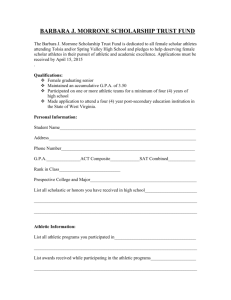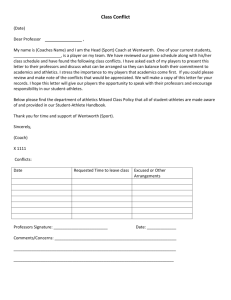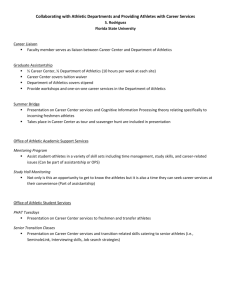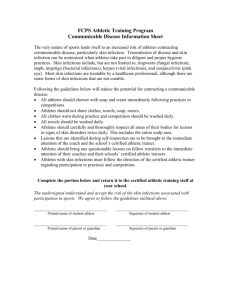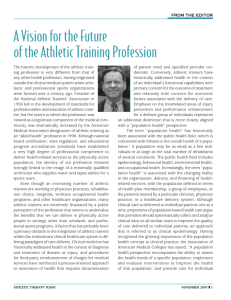Part I: Do you know what your skills are
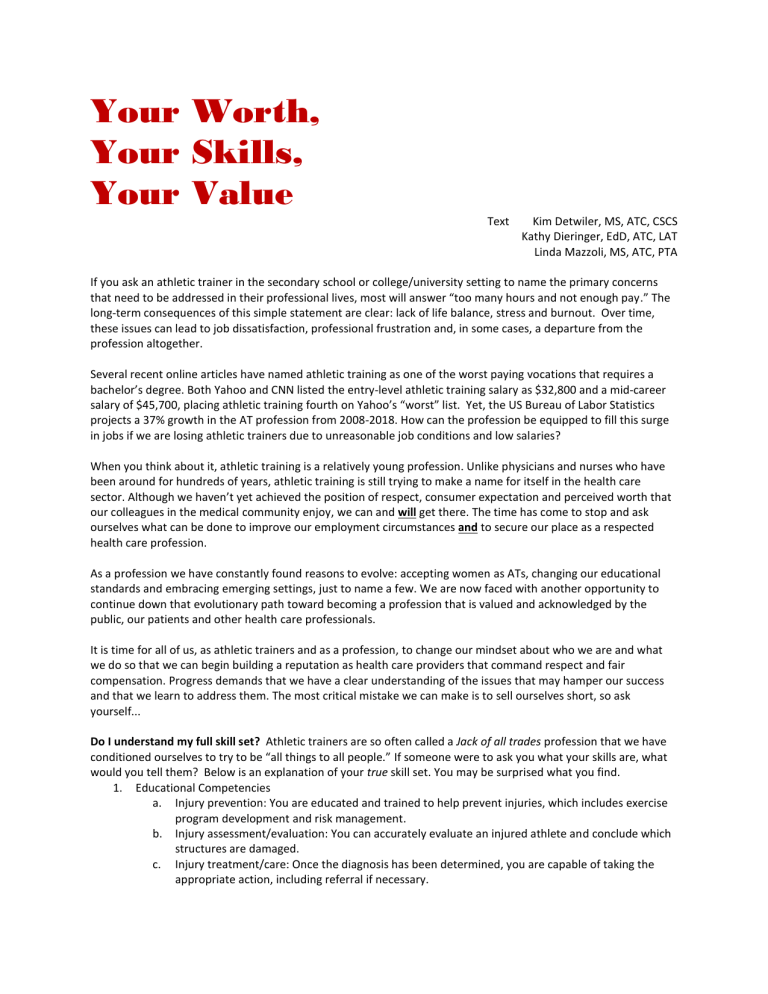
Your Worth,
Your Skills,
Your Value
Text Kim Detwiler, MS, ATC, CSCS
Kathy Dieringer, EdD, ATC, LAT
Linda Mazzoli, MS, ATC, PTA
If you ask an athletic trainer in the secondary school or college/university setting to name the primary concerns that need to be addressed in their professional lives, most will answer “too many hours and not enough pay.” The long-term consequences of this simple statement are clear: lack of life balance, stress and burnout. Over time, these issues can lead to job dissatisfaction, professional frustration and, in some cases, a departure from the profession altogether.
Several recent online articles have named athletic training as one of the worst paying vocations that requires a bachelor’s degree. Both Yahoo and CNN listed the entry-level athletic training salary as $32,800 and a mid-career salary of $45,700, placing athletic training fourth on Yahoo’s “worst” list. Yet, the US Bureau of Labor Statistics projects a 37% growth in the AT profession from 2008-2018. How can the profession be equipped to fill this surge in jobs if we are losing athletic trainers due to unreasonable job conditions and low salaries?
When you think about it, athletic training is a relatively young profession. Unlike physicians and nurses who have been around for hundreds of years, athletic training is still trying to make a name for itself in the health care sector. Although we haven’t yet achieved the position of respect, consumer expectation and perceived worth that our colleagues in the medical community enjoy, we can and will get there. The time has come to stop and ask ourselves what can be done to improve our employment circumstances and to secure our place as a respected health care profession.
As a profession we have constantly found reasons to evolve: accepting women as ATs, changing our educational standards and embracing emerging settings, just to name a few. We are now faced with another opportunity to continue down that evolutionary path toward becoming a profession that is valued and acknowledged by the public, our patients and other health care professionals.
It is time for all of us, as athletic trainers and as a profession, to change our mindset about who we are and what we do so that we can begin building a reputation as health care providers that command respect and fair compensation. Progress demands that we have a clear understanding of the issues that may hamper our success and that we learn to address them. The most critical mistake we can make is to sell ourselves short, so ask yourself...
Do I understand my full skill set? Athletic trainers are so often called a Jack of all trades profession that we have conditioned ourselves to try to be “all things to all people.” If someone were to ask you what your skills are, what would you tell them? Below is an explanation of your true skill set. You may be surprised what you find.
1.
Educational Competencies a.
Injury prevention: You are educated and trained to help prevent injuries, which includes exercise program development and risk management. b.
Injury assessment/evaluation: You can accurately evaluate an injured athlete and conclude which structures are damaged. c.
Injury treatment/care: Once the diagnosis has been determined, you are capable of taking the appropriate action, including referral if necessary.
d.
Injury rehabilitation: You can develop and implement exercise programs to help active individuals recover from an injury.
2.
Time management: You effectively and efficiently manage your time between several tasks while ensuring your athletes receive quality care
3.
Research: You monitor the latest trends in health care products, use injury surveillance, evidence-based research, best practices, and other resources to ensure you are providing the most effective health care you possibly can. You know the importance of peer-to-peer learning and collaboration and seek to expand your knowledge through your colleagues and professional literature such as the Journal of Athletic
Training.
4.
Critical thinking: You are able to problem solve your way through a variety of situations, both in terms of injury and non-injury situations and can find the most appropriate solution.
5.
Compassion for the person, not just the injury: You see the broader picture of the individual and understand how an injury or a powerful workout will affect them.
6.
Networking and professionalism: You are skilled at interacting with parents, athletes, medical professionals and the layperson with respect and kindness.
7.
Effective communication: You demonstrate empathy, understanding and sensitivity when interacting with others, but also can exert authority and conviction when needed.
8.
Organization and Management: a.
Facility: You play an important role in the daily operation of a health care facility. b.
Staff: You manage people who work for you and with you. c.
Business: You manage the day-to-day operations of your facility and your program as a business.
9.
Creativity: You can do things like take a limited budget and make it stretch through the whole school year, turn a small closet into a functional medical facility and use what you have to help your athletes at home and on the road
10.
Finances: You have experience with budgeting, resource allocation, capital improvements, A/R, purchasing, etc.
11.
Listening skills: Athletic trainers are probably one of the best health care professions in terms of listening skills, whether it’s one on one with a patient or in a loud and crowded facility.
12.
Current: In most cases, you are required to earn continuing education in order to keep your certification or licensure; this keeps your skills up-to-date and ensures continuous growth and learning.
The first step toward change is to recognize and acknowledge your unique skill set as an athletic trainer. You must then communicate it to your patients, co-workers, administrators and your community. Let your true scope of expertise sink in so that others recognize the skills you possess and use on a regular basis. Understand that you should be respected and compensated for the unique experiences and abilities you bring to the table. When you do, you’ll have the confidence needed to advocate for yourself. If you feel you don’t possess some of the skills listed, find opportunities to build those skills so that you can demonstrate even more worth.
Am I comfortable articulating my skills and advocating for myself?
Now that you understand your true skill set, do you feel that you don’t get paid enough for all you do? You are a health care professional and should be treated and paid like one. How do you make that happen?
1.
Compare your skill set to other health care professionals. You’ll find that you, too, are a valuable health care professional (regardless of work setting).
2.
Consider your strongest skills and identify those you can improve. Spend time considering how you can maintain your strengths, build your mediocre skills, and strengthen your weakest skills.
3.
Recognize areas of your job where you don’t feel supported by your administration. Consider how to portray those needs in a positive light and with adequate research to support your claims.
4.
If you work in the secondary school or collegiate setting you are probably not billing, so you must find another method to show your value. Even if you are not billing insurance companies directly, you are providing worth or generating revenue in other means.
a.
Document every treatment you give and every rehab you perform. Use your software program to assign a CPT code to everything you do on a daily basis and assign a dollar value to that code. b.
Document in a detailed and professional manner on every athlete in every situation. c.
Athletic training facilities should be referred to, and run as health care facilities. Documentation must reflect the detail and precision that is required of a health care professional, and your demeanor should reflect that professionalism. Ask athletes to make appointments, post your hours and adhere to them. d.
Run reports outlining your activities throughout the year and explain them to your superiors. You have generated revenue on many levels. You saved parents revenue by treating their children rather than sending them to outpatient rehabilitation. You saved the secondary insurance company money by not billing for your services. You saved revenue for the school by keeping athletes in class rather than sending them off-campus for appointments with other health care providers. e.
Be up to date on the research on national, regional and local norms on the utilization and perceived value of athletic training services. Use this information to establish and reinforce your value to your employer and consumer.
5.
Look at the NATA Salary Survey results to find out how others in similar situations are compensated.
Maybe even ask other ATs in your conference. a.
If they’re making more, use that data to support your requests for a higher salary b.
If they’re making less, show what you are doing to deserve the higher salary. c.
If they’re making the same, figure out how your administration can invest more resources into your program so that athletes receive even better care than they are already getting.
6.
Ask to meet with your administrators to discuss your performance and how you can improve. Use this as an opportunity to explain what you do and why you deserve to be compensated fairly.
Overcome Your Fear
This is not a fool-proof process and you will likely encounter hurdles along the way. Below are a few strategies to help you overcome some of the most common obstacles you may face.
The administrators agree with you, but say “there’s just no money.”
When is a good time to visit again so that it can be built into next year’s budget?
They tell you “no,” but say “maybe next year” or something to that effect.
When is a good time to visit again so that it can be built into next year’s budget?
They say they have to check with their superior and later inform you that the answer is no.
I would be happy to visit with him/her myself, but wanted to respect the chain of command. I can make an
appointment with him/her to discuss this. When you meet, be prepared with a presentation to help you demonstrate your value to the school, the athletics program and the student athletes.
They tell you “no,” and leave no window of opportunity for change in the future
Consider updating your resume.
They say “yes”
Make sure you communicate your gratitude and appreciation, and work with your supervisor to establish a concrete process to implement the agreed upon plan of action.
You have now been equipped with a new definition of your skill set and a step-by-step guide to advocating for yourself and a higher salary. Change in this profession starts with you, so make it happen. You can do it!
